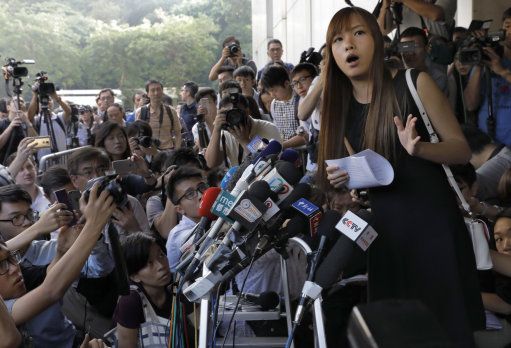Yesterday, the High Court in Hong Kong ruled that two pro-independence activists cannot take their seats on the legislative council (Legco). Baggio Leung and Yau Wai-ching, members of the Youngspiration party, were elected in September but, at the swearing-in ceremony last month, deliberately mangled their oaths while holding a banner that read “Hong Kong is NOT China.”
They were not the first to use the swearing-in to make a political point. When Wong Yuman, elected as a representative of the People’s Party In 2012, coughed all the way through his first attempt and concluded by shouting, "Down with the Hong Kong communist regime,” he was allowed to retake the oath. On the second attempt, he began with a short prayer in which he asked God to forgive him for swearing a false oath, then recited it bizarrely.
The episode seems childish, but in an assembly in which more than half the seats are controlled by Beijing, genuinely elected representatives are possessed of little in the way of effective weapons. Until this month, however, they did have the support of a robust judiciary that had on occasion itself taken to the streets to defend Hong Kong’s judicial independence from the mainland.
In 2012, the Legco president, Jasper Tsang Yok-sing, overruled protests by a Beijing loyalist and let Wong take his seat. Any further complaints he said, should be taken to the courts. This time, the Chinese government pre-empted the Hong Kong courts with a ruling by the National People’s Congress in Beijing that neither of the two delinquents would be allowed to retake the oath.
That intervention triggered protests in the streets and a series of court challenges in Hong Kong against other elected members, mostly from the democratic end of the spectrum, but one against the profoundly unpopular Chief Executive, the mainland loyalist CY Leung. (He seems intent on pleasing the one constituency that now counts—Beijing—in the hope of securing another term when his current one expires in 2017).
Beijing’s move may have been intended to put a stop to this disrespectful exercise of democracy and free speech. Instead, like many of Beijing’s recent interventions in Hong Kong affairs, it threatens to create further resistance.
The 1984 Sino-British Joint Declaration laid out a “one country, two systems” arrangement that was to apply for 50 years following the handover of Hong Kong to China in 1997. The Basic Law was Hong Kong’s guarantee that its 5m people would continue to enjoy the rule of law, freedom of expression, freedom from torture and, for the most part, from corruption: in all, a much larger measure of liberty than exists on the mainland.
The “one country, two systems” arrangement also provided for a widening franchise in elections for the position of Hong Kong’s chief executive. It was Beijing’s refusal to countenance an electoral system that did not allow it to choose the candidates that triggered the umbrella protests of 2014, in which an entirely new generation entered politics.
Some of the stars of that movement, such as the high school student Joshua Wong, had cut their political teeth in an earlier fight over Beijing’s interference in the school curriculum, and the movement represented a radical shift in Hong Kong’s political centre of gravity. Not only had thousands of young people come out to defend their shrinking freedoms, but many of them had concluded that, in the face of what they saw as Beijing’s intransigence and bad faith, the best guarantee of those freedoms in the long term was independence. When Beijing refused to budge, six of them were subsequently elected to Legco, and the stakes were sharply raised.
The fate of Hong Kong has evoked little sympathy in mainland China, where a harsh crackdown on civil liberties is underway under President Xi Jinping. Many mainland Chinese regard Hong Kong as an overprivileged ex-colony that already enjoys much greater liberty than the mainland. But in Taiwan, which is regarded by Beijing as a “renegade province,” the fate of Hong Kong is closely monitored. Any peaceful reunification between Taiwan and the People’s Republic would likely involved a proposal similar to Hong Kong’s “one country, two systems.”
That system was designed to reassure residents and then Prime Minister Margaret Thatcher that life under the Chinese Communist Party would be indistinguishable from the present. But Beijing’s steady encroachment on Hong Kong’s judicial independence, its manipulation of its proto-democratic institutions and the steady suffocating of freedom of expression— manifest in attacks on journalists, the kidnapping of five Hong Kong publishers and booksellers, and the purchase by mainland interests of major Hong Kong media—do not present an encouraging model to Taipei.
If it fails in Hong Kong, why should Taiwanese trust an offer of “one country two systems.” for themselves? Those with a sense of history, of even longer memories, might recall that a similar model was offered to Tibet under the so-called Seventeen Point Agreement for the Peaceful Liberation of Tibet. It did not last a decade.
Hong Kong’s shrinking freedoms
A judicial ruling is the latest worrying development, and Taiwan will be taking note
November 16, 2016

©Vincent Yu/AP/Press Association Images











